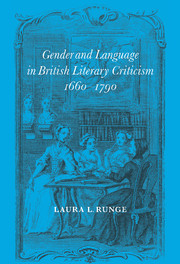2 - Dryden's gendered balance and the Augustan ideal
Published online by Cambridge University Press: 15 September 2009
Summary
In 1679 John Dryden compares Shakespeare's “masculine,” “bolder,” and “fiery” genius with Fletcher's “more soft and womanish” creativity, employing the language of gender to set two male literary figures into hierarchical antithesis. The example typifies one of several uses Dryden makes of gendered language as a component of his critical vocabulary, illustrating the understanding of gender as a social category to which he ascribes certain measures of worth. Dryden's criticism is pivotal in this study because its dialogism between gendered discourse and literary value is diverse and conspicuous, and because it plays an enormously influential role in the development of criticism in eighteenth-century British literature. In the century following his life, Dryden's critical writings generated numerous imitations, and his privileging of heroic literature and harmonious versification set enduring standards of taste. In his varied applications of gendered language, Dryden relies on the ideals of male heroism and female refinement, specific configurations of gender in Restoration discourse; these social categories correspond with a model of polite gendered relations that informs Dryden's poetic. Dryden joins the masculine flights of imagination with the sweetness and smoothness of feminine prosody to produce what becomes the Augustan golden mean.
Given the vitality of the gendered dynamic in Dryden's criticism, it is significant that the dominant view of his critical ideal – and of Dryden himself – largely ignores the feminine aspects of his conceptions.
- Type
- Chapter
- Information
- Publisher: Cambridge University PressPrint publication year: 1997

